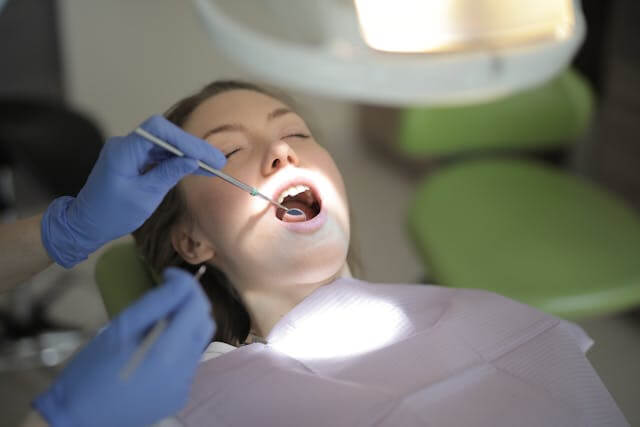Many people who walk into the dental clinic to see the dentist have dental anxiety. Dental anxiety is a public health concern globally. According to WebMD 9% to 20% of Americans avoid going to the dentist because of anxiety.
If you are anxious, the dentist may find it difficult to offer care.
Causes of Dental Anxiety
Dental anxiety has a number of causes some which include:
Fear of Pain
Many people who visit the dentist have an impression that dental treatment is painful. This singular fear will make the patient anxious. An anxious person is usually suspicious of the dental clinic environment and the dental equipment and materials. This makes it difficult to treat the patient.
Fear of Needle
Administration of local anaesthesia is an important aspect of dental treatment. Many dental treatments require the use of local anaesthesia. However, the site of dental syringes is a common cause of dental anxiety. Many dental patients on seeing the dental syringe and needle become anxious and would not want the treatment to continue. This delays treatment and eats into the time the dentist would have used to see other patients that may be waiting.
Cost of Treatment
People of low socioeconomic status tend to avoid visiting the dentist because they believe that dental treatments are expensive and that they may not afford the cost of the treatment. The notion that dental treatments are expensive may trigger dental anxiety in a patient.
A Previous History of an Eventful Dental Treatment
A previous bad experience can be a trigger to developing dental anxiety. For example, a patient who had a very difficult and painful tooth extraction is likely to remember the kind of distress they went through in their subsequent dental visits. This might make them not give the dentist full cooperation when next they visit the dentist.
Having a Feeling of an Impending Danger
Some people walk into the dental clinic not knowing what to expect regarding their dental treatment. This may trigger feelings that suggest that the treatment may not augur well with them. Such bad feelings can make the patient anxious and afraid to undergo a dental procedure.
Previous Experience of Dental Negligence
Dental negligence is a serious issue. Patients who have suffered complications as a result of dental negligence are very likely to develop dental anxiety. Such people may not want to have anything to do with the dental clinic as a visit to the dentist would remind them of their previous traumatic experience.
Sound of Dental Instruments
Certain dental instruments and equipment produce sounds when in use. For example, instruments like the ultrasonic scaling machine, cavity drilling machine (handpiece), compressor, air-jet, etc have characteristic sounds that may arouse a patient’s inquisitiveness. This can trigger dental anxiety and make it difficult for the patient to cooperate during dental examinations and treatments.
Physical or Sexual Abuse
According to a literature published by International Journal of Dentistry, victims of sexual abuse may find it difficult to tolerate dental treatment.
Visiting a dentist can cause unpleasant memories of abuse to come alive resulting in anticipation of pain.
Patients who have suffered sexual victimisation in the past may not want to be touched, or allow dental instruments in their mouth, especially if the sexual abuse involved their mouth. They also tend to be sensitive to certain smells which makes them uneasy and unsettled for dental treatment.
Physical abuse is common among adolescents. Studies have shown that children and adolescents who are victims of physical abuse have a high tendency of developing dental anxiety.
If you are showing any of the following attitudes or behaviour, it may be a pointer that you are experiencing dental anxiety.
1. Routinely Missing of Dental Appointments
If you are so scared of receiving dental treatments that you begin to miss appointments with your dentist, it is a clear sign that you have dental anxiety. Some will feign sickness, claim not to have time, all in a bid to ensure that they will not keep their dental appointments.
2. Uneasiness at the Thought of Seeing a Dentist
If the thought of going to see a dentist or an advice from someone to go see a dentist makes you uneasy, you may be experiencing dental anxiety. A lot of people who hesitate to visit the dental clinic for either a check up or for an obvious dental complaint, may be delaying their visit because of dental anxiety.
3. Feeling of Embarrassment When Asked to Open Your Mouth For Dental Examination
This is common among women. Some people who visit the dental clinic have a problem opening their mouth for a dental examination. This attitude may be due to the fact that these individuals are not proud of either their oral hygiene or their teeth and feel embarrassed when it appears that someone else is about to see the state of their teeth.
If you are in this category of individuals, this may be a pointer that you are having dental anxiety.
4. Avoiding the Dental Clinic And/or the Dentist
Some people would rather resort to self medication than visit the dental clinic to have their dental concerns attended to. I consider this attitude to be the height of dental anxiety, because those Individuals that completely boycott dental care out of fear are prone to suffer serious complications in their oral health.
5. Lack of Confidence In The Dentist or the Dental Team
Dental anxiety can make a person display attitudes that suggest they lack confidence in the ability of the dentist or the dental team to take good care of them.
If you find yourself disapproving of the diagnosis given by the dentist after a thorough history taking, dental examinations and investigations, or detecting for the dentist or the dental team what dental procedures they should carry out on you, you are simply expressing a lack of confidence in the team’s ability, and this could be as a result of anxiety or outright fear, which is making you not want the proposed treatment.
Conclusion
Dental anxiety is very real and has hindered many from accessing dental care at the right time. Serious complications may arise as a result of delaying dental checkups and treatments.
Don’t let anxiety rub you of the opportunity to maintain a good oral health status. If you are having dental anxiety, you can seek help by discussing your fears with your dentist or doctor. It might interest you to know that some of the things we fear about dental care are actually unfounded and elusive.









